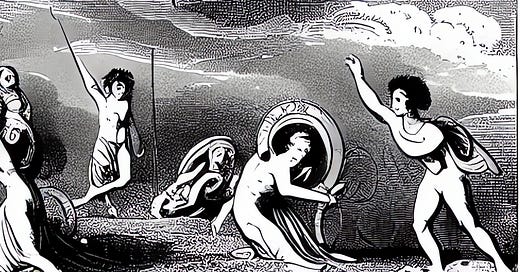Introducing a thought experiment
What if a thing we know functioned like a totally different thing?

After spending most of the last decade working in innovative and alternative approaches to learning, over the past year I've found myself interacting more with traditional education systems and working on projects that are trying to find ways to bring more non-traditional approaches into that world.
It ain't easy, but I do find myself thinking that we may be at one of those sea change moments...then again, I've thought that in the past, and let's just say that the tide didn't quite go out as far as I would have expected. Public education systems are kind of designed to be change averse, but the reason that I see more potential right now is because one of the biggest hurdles to change is crumbling: our ability to imagine something different than the current governing logic.
This is absolutely a post-pandemic aftershock that has come about because of two different, intertwined phenomena:
families saw how the sausage gets made as a result of remote schooling. Whereas normally, kids would go off to school and their experience for the next 6-8 hours would be pretty opaque, during remote schooling that experience was suddenly visible. The important aftershock here was lots of people starting to ask, "why does [feature x of public school] have to be this way?" and sometimes even going a layer deeper into "why is the logic of this system [assumption y]?"
there was a necessary emergence of alternate options. Remote schooling in itself, as done by most traditional schools, was an alternative that was implemented with varied levels of efficacy - with the key dependency being, "how well does the school realize that online doesn't mean just doing what you would have done, but on a screen?" But beyond that, there were homeschooling pods, hybrid schooling models, new digital-first schools, community schools, and so on and so forth. In response to the questions of "why does it have to be this way?" quite a few new things emerged that said "you know, maybe it doesn't."
At the same time, then, we have both opened up Pandora's box while mostly just exploring possibilities that still fit within the governing logic of school. Rather than do a deep dive on what that governing logic is, I'll just defer to Ivan Illich and his chapter in Deschooling Society on the Phenomenology of School - if you want to expose the seams, that's as good a place as any to start.
What I have been more interested in lately is a thought experiment: what if we turned over the enterprise of education to various different institutions that don't come from that same governing logic? If we took a different set of assumptions and applied them to building systems for learning, what might that look like? From time to time over the next several months, I'm going to do a few of these. A few of my own guidelines for how I'm going to approach this:
I'm not going to be comprehensive. I'm not trying to do a full operational model for how [institution z] would run things.
I am going to focus on the most salient differences. I want to dig deeper into Pandora's box and imagine significantly different alternatives.
Many of these will be for-profit companies. For the sake of this exercise, we're going to imagine a full separation of church & state - we are taking some of the fundamental DNA of the institution, but it has no ability to profit the company itself.
I'm going to be value neutral. I'm not trying to say this would be a better approach, just that it would be a different approach. Let's be real: I'm going to highlight more of the positive differences, but I'll also bring in some of the tradeoffs and downsides as well.
It would be such a tease to just introduce this series and not do the first installment, wouldn't it? Tell you what - I'll have it in your inbox next week. But as a hint, let me just say that for this series, I don't think you'll want to miss any of them - or, rather, you'll want to catch 'em all.
Some Links, perhaps?
In part as an amuse bouche, and in part because I’ve been wanting to share these for a while now…a few things I’ve been reading & listening to lately around the topic of broken things.
I binged this podcast on how phonics was booted out of public schools in the US and how it’s now being restored. Also a cautionary tale about the intersection of corporate profit motives & public services.
What’s broken in here is an analogy, and unfortunately one that has become quite pervasive (I have used it myself a few times because it feels like it has so much explanatory power). Also an interesting lens for considering the delta between synthetic intelligence and human intelligence.
Two excellent recent reads on the way AI will contribute to the sea change in education - one from Nafez Dakkak and another from Sam Chaltain.
And finally, a consideration that this might be a sickness that runs deeper than education - that building anything new or different has just become an intractable challenge.



